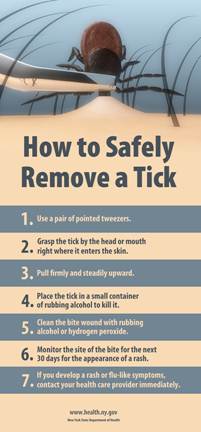New York state is taking a stand in fighting and preventing Lyme Disease. The state has announced it's setting aside $1-million-dollars to fund research, education and prevention, in its effort to fight the dangerous tick borne illness. This is one of several measures related to Lyme disease that was passed during this year's legislative session.
It's important for you and your family to be tick free!
Ticks can spread disease. Not all ticks can cause disease and not all bites will make you sick, but as these diseases become more common it's important to learn how to prevent a bite, how to remove a tick and what to do if you think you could have a tick-borne disease.
Lyme disease is the most common disease spread by ticks in New York but there are other serious diseases spread by ticks. And like Lyme, the other diseases will begin to spread to other regions across the state.
Protect Against and Prevent Disease
Deer ticks live in shady, moist areas at ground level. They will cling to tall grass, brush and shrubs, usually no more than 18-24 inches off the ground. They also live in lawns and gardens, especially at the edges of woods and around old stone walls.
Once a tick gets on the skin, it generally climbs upward until it reaches a protected area.
In tick-infested areas, your best protection is to avoid contact with soil, leaf litter and vegetation. However, if you garden, hike, camp, hunt, work or otherwise spend time in the outdoors, you can still protect yourself:
- Wear light-colored clothing with a tight weave to spot ticks easily.
- Wear enclosed shoes, long pants and a long-sleeved shirt. Tuck pant legs into socks or boots and shirt into pants.
- Check clothes and any exposed skin frequently for ticks while outdoors.
- Consider using insect repellent.
- Stay on cleared, well-traveled trails. Walk in the center of trails. Avoid dense woods and bushy areas.
- Avoid sitting directly on the ground or on stone walls.
- Keep long hair tied back, especially when gardening.
- Bathe or shower as soon as possible after going indoors (preferably within two hours) to wash off and more easily find ticks that may be on you.
- Do a final, full-body tick check at the end of the day (also check children and pets), and remove ticks promptly.
